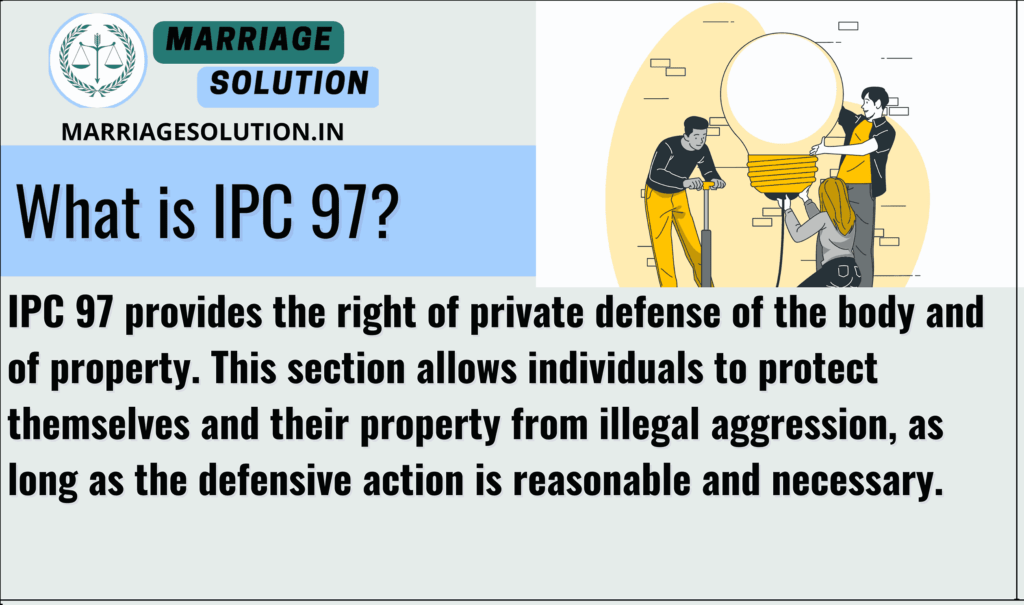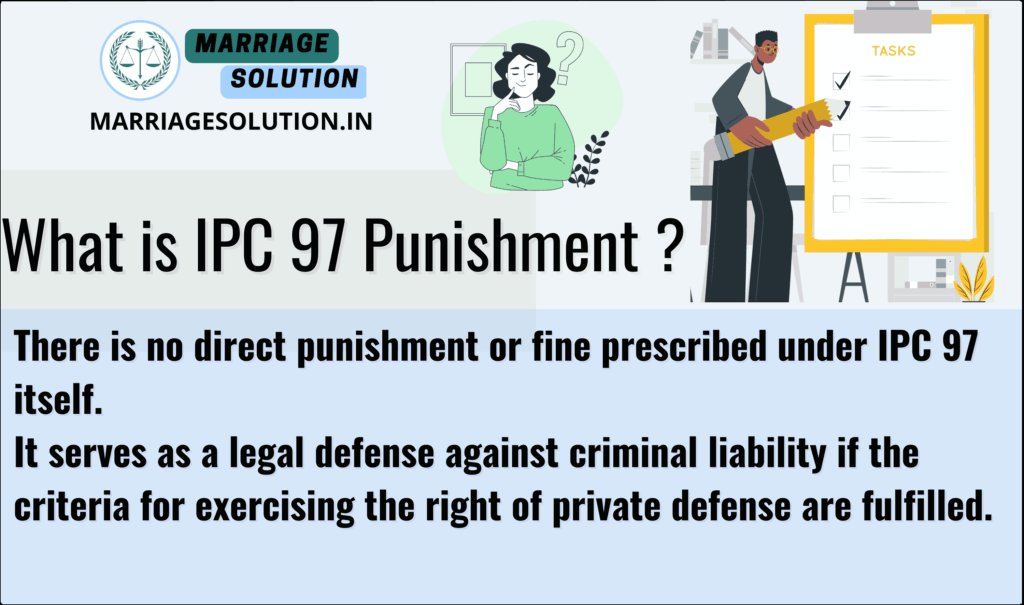Introduction of IPC 97
The Indian Penal Code (IPC) is a comprehensive code intended to cover all substantive aspects of criminal law in India. IPC 97 is a crucial section that deals with the right of private defense of the body and property. It specifies the circumstances under which individuals can protect themselves and their property from harm.
What is IPC Section 97 ?
IPC 97 provides the right of private defense of the body and of property. This section allows individuals to protect themselves and their property from illegal aggression, as long as the defensive action is reasonable and necessary.

IPC Section 97 Overview
IPC 97 of the Indian Penal Code deals with the right of private defense of the body and property. This section grants individuals the legal right to protect themselves and their property from illegal acts. It states that everyone has the right to defend their body and property against offenses affecting them, provided that the defense is necessary and reasonable. IPC 97 ensures that people can lawfully protect themselves and their belongings from harm
key-Points
Right to Self-Defense: This law allows people to use force or take actions in self-defense or defense of their property without facing criminal charges.
Reasonable Force: The force used in exercising the right of private defense must be reasonable and proportionate to the threat or danger faced.
Lawful Circumstances: The right of private defense can only be exercised in lawful circumstances, such as defending against an unlawful attack or trespass.
Case-by-Case Evaluation: Each case is individually evaluated based on evidence regarding the nature of the threat, the actions taken in defense, and their proportionality.
Public Interest Considerations: The aim is to balance the right to self-defense with the need to maintain public order and prevent excessive force.
Strict Legal Requirements: Specific legal criteria must be met for the right of private defense to apply, as it involves overriding potential criminal liability.
IPC 97 Punishment
There is no direct punishment or fine prescribed under IPC 97 itself.
It serves as a legal defense against criminal liability if the criteria for exercising the right of private defense are fulfilled.

97 IPC bailable or not ?
The question of bail is not directly relevant, as IPC 97 pertains to whether an offense was actually committed based on the exercise of the right of private defense.
Section 97 of case laws
IPC Section 97 of the Indian Penal Code provides the right of private defense of the body and property. It is an essential provision that allows individuals to protect themselves and their property from illegal aggression. Let’s explore IPC 97 in detail through eight key points, each supported by relevant case laws.
1. Right to Defend the Body
- Case: R v. Rose
- Facts: In this case, Rose killed her abusive husband while he was attacking her.
- Verdict: The court ruled that Rose acted in self-defense as she was protecting herself from imminent harm.
- Explanation: IPC 97 grants individuals the right to protect themselves from physical harm when faced with an immediate threat.
2. Right to Defend Property
- Case: K. M. Nanavati v. State of Maharashtra
- Facts: Nanavati shot and killed a man who was attempting to break into his home.
- Verdict: The court acquitted Nanavati, recognizing his right to defend his property under IPC 97.
- Explanation: IPC 97 allows individuals to protect their property from theft, damage, or trespass using reasonable force.
3. Reasonable Force
- Case: Munshi Ram v. Delhi Administration
- Facts: Munshi Ram and his family were attacked by a group of armed men. In defense, Munshi Ram used a firearm, resulting in the death of one attacker.
- Verdict: The Supreme Court held that Munshi Ram used reasonable force in self-defense.
- Explanation: The force used in defense must be reasonable and proportionate to the threat faced.
4. Imminent Threat
- Case: State of Uttar Pradesh v. Ram Swarup
- Facts: Ram Swarup shot and killed an attacker who had broken into his house at night.
- Verdict: The court ruled in favor of Ram Swarup, recognizing the imminent threat to his life.
- Explanation: The threat must be immediate and real for the defense to be justified under IPC 97.
5. Legal Protection
- Case: Mohinder Pal Jolly v. State of Punjab
- Facts: Mohinder Pal Jolly, a factory owner, killed an armed trespasser in self-defense during a break-in.
- Verdict: The Supreme Court acquitted Jolly, stating he was legally protecting himself.
- Explanation: Actions taken in legitimate self-defense are protected by IPC 97 and are not considered offenses.
6. Excessive Force Not Allowed
- Case: R v. Clegg
- Facts: Clegg, a soldier, shot and killed a person at a checkpoint, believing they posed a threat. It was later revealed that excessive force was used.
- Verdict: The court found Clegg guilty as the force used was excessive.
- Explanation: Using excessive force beyond what is necessary for defense is not protected under IPC 97.
7. Applicability to Property Defense
- Case: Darshan Singh v. State of Punjab
- Facts: Darshan Singh defended his property from burglars using a licensed gun, injuring one of them.
- Verdict: The court upheld his right to defend his property under IPC 97.
- Explanation: IPC 97 applies to the defense of both person and property, allowing reasonable measures to protect property.
8. Prevention of Legal Overload
- Case: State of Maharashtra v. Sindhi @ Raman
- Facts: Sindhi, during a heated argument, attacked in self-defense after being physically assaulted.
- Verdict: The court dismissed the case, acknowledging the self-defense claim under IPC 97.
- Explanation: IPC 97 helps prevent the courts from being overloaded with cases where self-defense is justifiable, ensuring that the judicial system focuses on more serious matters.
Section 97 IPC in short information
| Offense | Definition | Punishment | Bailable or Not |
|---|---|---|---|
| Acts in Self-Defense | Actions taken to protect oneself or others from immediate harm | Not Applicable | Not Applicable |
IPC 97 FAQs
What is IPC 97?
IPC 97 provides the legal right to defend oneself and one’s property from harm.
Does IPC 97 cover all acts of self-defense?
Yes, as long as the force used is reasonable and proportionate to the threat.
Can you use any force in self-defense?
No, only reasonable and necessary force is allowed. Excessive force is not protected.
If you need support with court proceedings or any other legal matters, don’t hesitate to reach out for assistance.
Court or any other marriage-related issues, our https://marriagesolution.in/lawyer-help-1/ website may prove helpful. By completing our enquiry form and submitting it online, we can provide customized guidance to navigate through the process effectively. Don’t hesitate to contact us for personalized solutions; we are here to assist you whenever necessary!
